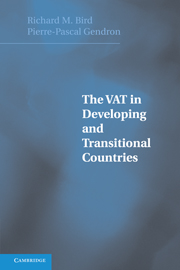Book contents
- Frontmatter
- Contents
- List of Tables
- Preface
- 1 Why This Book?
- 2 The Rise of VAT
- 3 Is VAT Always the Answer?
- 4 Trade and Revenue
- 5 Equity and the Informal Sector
- 6 What Should Be Taxed?
- 7 Key Issues in VAT Design
- 8 New Issues in VAT Design
- 9 Administering VAT
- 10 Dealing with Difficulties
- 11 The Political Economy of VAT
- 12 Where Do We Go from Here?
- Annex
- References
- Index
4 - Trade and Revenue
Published online by Cambridge University Press: 16 November 2009
- Frontmatter
- Contents
- List of Tables
- Preface
- 1 Why This Book?
- 2 The Rise of VAT
- 3 Is VAT Always the Answer?
- 4 Trade and Revenue
- 5 Equity and the Informal Sector
- 6 What Should Be Taxed?
- 7 Key Issues in VAT Design
- 8 New Issues in VAT Design
- 9 Administering VAT
- 10 Dealing with Difficulties
- 11 The Political Economy of VAT
- 12 Where Do We Go from Here?
- Annex
- References
- Index
Summary
Almost every country now has a VAT. But is the VAT now in place in most developing and transitional countries as good as it could be? Must ‘good’ VATs always follow the same pattern? Can every country administer VAT sufficiently well to make the introduction of the tax worthwhile? Is VAT always the best way to respond to the revenue problems arising from trade liberalization? Can VAT be adapted to cope with the rising demands in some countries, especially federal countries, for more access to revenues by local and regional governments? Can VAT deal with such new problems as those arising from changes in business practices with financial innovations and digital commerce? The answers to such questions are critical in many emerging economies. VAT is too important for them not to get the answers right – or at least as right as possible.
VAT remains the best form of general consumption tax available. If a developing or transitional country needs such a tax, as most of them do, then, as we suggested in Chapter 3, VAT is the one to have in almost all cases. Of course, this does not mean that the VAT most such countries already have has been either designed or implemented in the best possible way, as we discuss in Chapters 6 through 10. In addition, some serious criticisms have recently been leveled against VAT as a source of revenue for emerging economies. We consider many of these criticisms in this and the next chapter.
Information
- Type
- Chapter
- Information
- The VAT in Developing and Transitional Countries , pp. 48 - 69Publisher: Cambridge University PressPrint publication year: 2007
Accessibility standard: Unknown
Why this information is here
This section outlines the accessibility features of this content - including support for screen readers, full keyboard navigation and high-contrast display options. This may not be relevant for you.Accessibility Information
- 1
- Cited by
